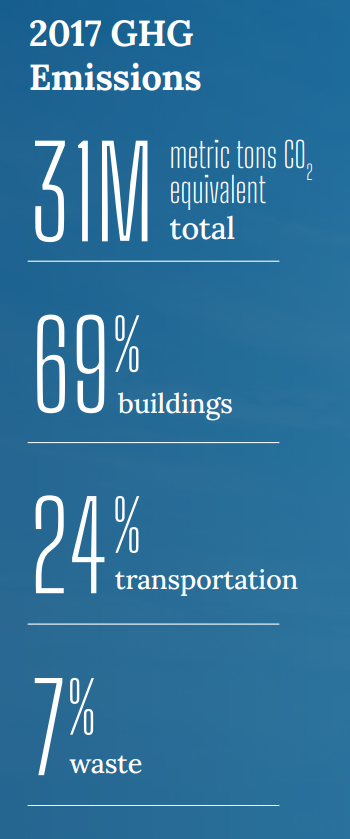Electrify Chicago
An independent tool for viewing City of Chicago building data
According to the
2022 Chicago Climate Action Plan,
69% of Chicago's emissions come from buildings, making
building emissions our biggest challenge and our biggest opportunity as a city
to tackle climate change. At Electrify Chicago, we showcase building performance using
publicly available data supplemented by community-submitted photographs and building
owners.
Start by looking at Chicago's buildings with the highest greenhouse gas intensity i.e. emissions per square foot. Large, efficient, buildings can perform much better than very inefficient small buildings on this metric.
New Article
📰 $30 Million In Missed Fines
The City Of Chicago failed to collect $30 million in potential fines from the building benchmarking ordinance, reducing transparency and accountability.
Legislative update! 🎉
As of late January 2024, legislation is being introduced to require new use more efficient forms of water and space heating, via the Clean And Affordable Buildings Ordinance (CABO), which will reduce the number of highly polluting and inefficient buildings that end up on this site.
If you're in Chicago,
write to your alderman to support the CABO!
Chicago Buildings by Greenhouse Gas Intensity
Note: Data includes large Chicago buildings with data from 2022, unless explicitly stated otherwise.
Note: This data only includes buildings whose emissions are reported
under the
Chicago Energy Benchmarking Ordinance. According to the City “As of 2016,
this list includes all commercial, institutional, and residential buildings larger than
50,000 square feet.” This dataset is also then filtered to only buildings with
reported emissions > 1,000 metric tons CO2 equivalent.
The latest year of data is from 2022, but we update the site regularly when new data is available, and some buildings may have failed to report that year, and only have older data available.
| Property Name / address | Primary Property Type |
Greenhouse Gas Intensity (kg CO2 eq./sqft) |
Total Greenhouse Emissions (metric tons CO2 eq.) |
|---|---|---|---|
|
Norwegian American Hospital
1044 N Francisco Ave
| Hospital (General Medical & Surgical) | 19.8 kg/sqft
Highest 2%
| 6,197 tons
Highest 5%
|
|
East Bank Club
500 N Kingsbury St
| Fitness Center/Health Club/Gym | 19.7 kg/sqft
Highest 2%
| 5,978 tons
Highest 5%
|
|
3443 W ADDISON ST
🕰️
3443 W ADDISON ST
| Retail Store | 19.6 kg/sqft | 744 tons |
|
Stanley Manne Children's Research Institute
2430 N Halsted St
| Laboratory | 19.5 kg/sqft
Highest 3%
| 2,441 tons
Highest 18%
|
|
RML Specialty Hospital
🕰️
3534 W Van Buren
| Other - Specialty Hospital | 19.4 kg/sqft | 3,686 tons |
|
833 857 W FULTON MARKET
833 857 W FULTON MARKET
| Multifamily Housing | 19.4 kg/sqft
Highest 3%
| 1,177 tons
Highest 40%
|
|
Flanner Hall-ID# 158842
🕰️
(Loyola)
1068 W Sheridan Rd
| Mixed Use Property | 19.4 kg/sqft | 1,253 tons |
|
Jewel Osco, 03441-Ashland & Wellington
2940 N Ashland Ave
| Supermarket/Grocery Store | 19.4 kg/sqft
Highest 3%
| 1,443 tons
Highest 33%
|
|
Jewel Osco, 03349-Narragansett & Diversey
2520 N Narragansett Ave
| Supermarket/Grocery Store | 19.2 kg/sqft
Highest 3%
| 1,237 tons
Highest 38%
|
|
Stuart Building
🕰️
(Illinois Tech)
10 W 31st Street
| College/University | 19.1 kg/sqft | 1,601 tons |
|
Jewel Osco, 03224-Irving Park & Narraganset
6430 W Irving Park Rd
| Supermarket/Grocery Store | 19.1 kg/sqft
Highest 3%
| 1,098 tons
Highest 42%
|
|
025110 - Stony Island Plaza
🕰️
1617-1754 E 95th St
| Strip Mall | 19.1 kg/sqft | 3,620 tons |
|
Riverside Square & River's Edge/ 90033
🕰️
3145 S Ashland Ave
| Supermarket/Grocery Store | 19.0 kg/sqft | 1,418 tons |
|
03262-Irving Park & Cicero
4660 W Irving Park Rd
| Supermarket/Grocery Store | 19.0 kg/sqft
Highest 3%
| 1,348 tons
Highest 35%
|
|
NMH Feinberg Pavilion and Galter Pavilion
🚨
(Northwestern)
251 E Huron St
| Hospital (General Medical & Surgical) | 19.0 kg/sqft
Highest 3%
| 41,775 tons #5 Highest
|
Data Source:
Chicago Energy Benchmarking Data
